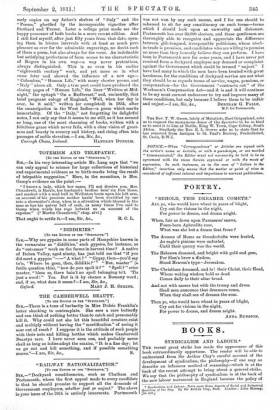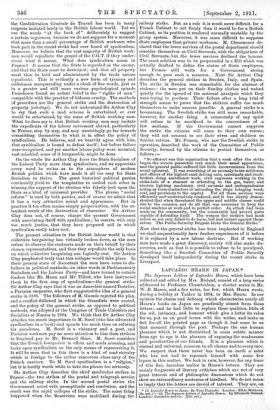BOOKS.
SYNDICALISM AND LABOUR.*
THE recent great strike has made the appearance of this book extraordinarily opportune. The reader will be able to understand from Sir Arthur Clay's careful account of the development of syndicalism, the philosophy—if one may so describe an infamous method of reasoning—which is at the back of the recent attempt to bring about a general strike. We say that the philosophy of syndicalism is at the back of the new labour movement in England because the policy of • Syndicalism and Labour: Notes upon Some Aspects of Social and Industrial Questions of the Day. By Sir Arthur Clay, Bart. London : John Murray.
[6s. net.]
the Confederation Generale du Travail has been in many respeets imitated lately in the British labour world. Yet we use the words " at the back of " deliberately to suggest a certain vagueness, because we do not suppose for a moment that more than a small percentage of British workmen who took part in the recent strike had ever heard of syndicalism. Moreover, we believe that the vast majority of British work- men would repudiate the gospel of the C.G.T. if they under- stood what it means. What does syndicalism mean in France ? It means that the State is regarded as the enemy, and that the State must be destroyed ; and that all property must then be held and administered by the trade unions (syndicats). This is evidently a new form of tyranny and selfishness masquerading under a cloak of fine words, just as in a greater and still more curious psychological episode Frenchmen found an ardent belief in the " rights of man " compatible with the practice of hideous cruelty. The methods of procedure are the general strike and the destruction of property (sabotage). We do not understand Sir Arthur Clay to say that such a mad scheme is entertained, or ever would be entertained, by the mass of British working men. What he does say is that British working men may imitate the expedients of the labour movement abroad, particularly hi France, step by step, and may unwittingly go far towards committing themselves to what is in effect the policy of syndicalism. He believes, and we heartily agree with him, that syndicalism is bound to defeat itself ; but before failure were recognized, and yet another labour policy were invented, vast mischief, some of it irreparable, might be done.
On the whole Sir Arthur Clay fears the State Socialism of the Labour Party more than syndicalism, and we appreciate every word he writes as to the atmosphere of modern British politics which have made it all too easy for State Socialism to thrive. The great historical political parties continually yield to the temptation to outbid each other in winning the support of the electors who falsely look upon the State as a kind of universal provider. The phrase " social reform" is used by both parties, and of course we admit that it has a very attractive sound and appearance. But in practice it too often means simply pauperization, with the at- tendant result of the destruction of character. Sir Arthur Clay does not, of course, charge the present Government with associating itself with syndicalism; he asserts, with only too much justice, that they have prepared soil in which syndicalism easily takes root.
The present situation in the British labour world is that collective bargaining has virtually broken down, as the men refus6 to ohserve the contracts made on their behalf by their chosen representatives, and thus they repudiate the only basis on which collective bargaining can logically rest. Six: Arthur Clay prophesied truly that this collapse would take place. In their present state of discontent the men have come to dis- believe in political methods—in other words in Parliamentary Socialism and the Labour Party—and have turned to outside leaders like Mr. Mann and Mr. Tillett, who have instructed them in the first step of syndicalism—the general strike. Sir Arthur Clay says that it was an Anarchist named Tortelier, a Parisian carpenter, who first suggested the idea of a general strike in 1888. The followers of M. Guesde rejected the plan, and a conflict followed in which the Guesdiste were routed, and the policy of the general strike, as opposed to political methods, was adopted at the Congress of Trade Unionists and Socialists at Nantes in 1894. We think that Sir Arthur Clay attaches too much importance to M. Sorel (who has advocated syndicalism in a book) and spends too much time on refuting his paradoxes. M. Sorel is a. visionary and a poet, and Parisian workmen pay no more attention to him than strikers in England pay to Mr. Bernard Shaw. M. Sorel considers that the French bourgeoisie is effete and needs arousing, and looks upon syndicalism as the only means of regenerating it. It will be seen that in this there is a kind of mad chivalry ivliich is foreign to the rather rancorous class envy of the Freiich Ouvriers. To M. Sorel syndicalism is a "religion; lint it is hardly worth while to take the phrase too seriously. ''tir Arthur Clay describes the chief syndicalist strikes in
France—the two strikes of the postal and telegraph service mid the railway strike. In the second postal strike the Government acted with promptitude and resolution, and the result was the rapid collapse of the strike. The same thing happened when the Reservists were mobilized during the railway strike. But as a rule it is much more difficult for a French Cabinet to act firmly than it would be for a British
Cabinet., as its position is rendered normally unstable by the group system. Moreover, it was more difficult to suppress. State employees than private workmen. M. Clemenceau de-
clared that the lower services of the postal department should consider themselves as Civil Servants, with the obligations of Civil Servants, but the lower services declined the honour. The exact solution was to be propounded in a Bill which was actually drafted to define the status of State employees, but France still waits for a Government strong enough to pass such a measure. Next Sir Arthur Clay describes the general strikes in Sweden, Italy, and Spain. The strike in Sweden was remarkable for the absence of violence : the men put on their Sunday clothes and waited quietly for the spread of the national paralysis which they were trying to produce. Their failure after a long trial of strength seems to prove that the strikers suffer too much themselves to make success possible. A general strike is a boomerang. The Swedish strike was still more remarkable, however, for another thing. A community of any spirit will refuse to be sacrificed to the convenience of a few sections. If the Government cannot suppress the strike the citizens will come to their own rescue ; they will not consent to see their wives and children on famine rations. Mr. Penson, who saw the Swedish strike in operation, described the work of the Committee of Public Security, formed by the citizens to protect themselves, as follows :—
" So efficient was this organization that a week after the strike began the streets presented very much their usual appearance, and the general public suffered but little inconvenience from the social upheaval. It was something of an anomaly to see noblemen and officers of the highest rank driving cabs, merchants and stock- brokers doing ambulance work, civil engineers working in the stoke-hole of a steamer or attending to the gas, water, and electric lighting machinery, civil servants and undergraduates acting as tram-conductors or unloading the ships bringing wood, coal, and provisions to the capital. Yet all these services were efficiently and unobtrusively rendered, and it was clearly demon- strated that when threatened the upper and middle classes could rise to the occasion and do all that was necessary to keep the social machine at work and in perfect order. An attack had been made on the community, but the community had proved quite capable of defending itself. The weapon the strikers had most relied on not only failed to do harm, but had turned against them- selves. The Public Security Brigade broke the General Strike."
Now that the general strike has been implanted in England we shall unquestionably have further experiences of it before it is replaced by a new labour doctrine. But if working
men have made a great discovery, society will also make dis- coveries, such as that it is possible to refuse to be paralysed. Something like a Swedish Committee of Public Security developed itself independently during the recent strike in Liverpool.







































 Previous page
Previous page